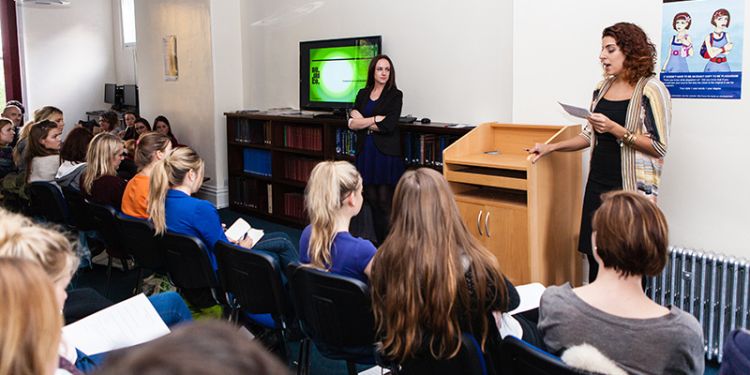Impact and engagement

Our researchers produce literature, language- and theatre-based research that benefits a diverse range of real-world contexts and communities. Our individual, collaborative and interdisciplinary research projects explore a broad scope of themes and ideas, with local, national and international reach.
Engagement and outreach opportunities exist alongside many of our research projects. For example, Writing Back matches University of Leeds students as pen pals with older people in Yorkshire to help tackle loneliness and isolation. This award-winning intergenerational writing project, initiated by Dr Georgina Binnie in 2014 has been rolled out on a national scale and continues to enjoy success among students and older adults alike.
Read about two projects where our researchers have achieved real-world impact in two very different areas:
1. Dialogic teaching
Dr Julia Snell is working with schools and teacher educators to improve the use of dialogic pedagogy in teaching practice. In dialogic pedagogy, teachers and pupils think through a topic together by engaging in exploratory and mutually respectful discussion. Snell and her research partner, Dr Adam Lefstein (Ben-Gurion University of the Negev) previously explored the potential and problems of dialogic teaching in their book, Better than Best Practice: Developing Teaching and Learning through Dialogue (Routledge, 2013).
The book, given from 2014 to 2016 to teacher mentors from 86 primary schools as part of a training programme to improve the quality of classroom talk, led to pupils making between one and two months’ extra progress in English, maths and science. Snell and Lefstein’s research has since been adopted by the video-based learning platform for teachers IRIS Connect, with IRIS Connect’s popular e-module ‘Film Club’ having been used by over 16,000 teachers to date.
2. Human trafficking
Dr Christiana Gregoriou led a team of researchers from the Universities of Leeds, Gloucestershire, Hull and Novi Sad to investigate how human trafficking is represented in news media, true crime and fiction. The team found that stories and reports of human trafficking are often stereotyped and overly simplistic.
On the basis of its research, the team issued a policy brief detailing its findings and making key recommendations for a wider audience. It also produced an open-access book, Representations of Human Trafficking: Present-day News Media, True Crime, and Fiction (Palgrave, 2018), which has since been used in the NGO Freedom United’s campaign for accurate reporting on modern slavery.

